Violin Sheet Music
 "People whose sensibility is destroyed by music in trains, airports, lifts, cannot concentrate on a Beethoven Quartet." Witold Lutoslawski
"People whose sensibility is destroyed by music in trains, airports, lifts, cannot concentrate on a Beethoven Quartet." Witold Lutoslawski
Igor Stravinsky

Igor Fyodorovich Stravinsky (17 June 1882 – 6 April 1971) was a Russian-born, naturalised French, later naturalised American composer, pianist, and conductor.
He is widely acknowledged as one of the most important and influential composers of 20th century music. He was a quintessentially cosmopolitan Russian who was named by Time magazine as one of the 100 most influential people of the century. He became a naturalised French citizen in 1934 and a naturalized US citizen in 1945. In addition to the recognition he received for his compositions, he also achieved fame as a pianist and a conductor, often at the premieres of his works.
Stravinsky's compositional career was notable for its stylistic diversity. He first achieved international fame with three ballets commissioned by the impresario Sergei Diaghilev and performed by Diaghilev's Ballets Russes (Russian Ballets): The Firebird (1910), Petrushka (1911/1947), and The Rite of Spring (1913). The Rite, whose premiere provoked a riot, transformed the way in which subsequent composers thought about rhythmic structure, and was largely responsible for Stravinsky's enduring reputation as a musical revolutionary, pushing the boundaries of musical design.
After this first Russian phase Stravinsky turned to neoclassicism in the 1920s. The works from this period tended to make use of traditional musical forms (concerto grosso, fugue, symphony), frequently concealed a vein of intense emotion beneath a surface appearance of detachment or austerity, and often paid tribute to the music of earlier masters, for example J.S. Bach and Tchaikovsky.
In the 1950s he adopted serial procedures, using the new techniques over his last twenty years. Stravinsky's compositions of this period share traits with examples of his earlier output: rhythmic energy, the construction of extended melodic ideas out of a few two- or three-note cells, and clarity of form, of instrumentation, and of utterance.
He also published a number of books throughout his career, almost always with the aid of a collaborator, sometimes uncredited. In his 1936 autobiography, Chronicles of My Life, written with the help of Walter Nouvel, Stravinsky included his well-known statement that "music is, by its very nature, essentially powerless to express anything at all." With Alexis Roland-Manuel and Pierre Souvtchinsky he wrote his 1939–40 Harvard University Charles Eliot Norton Lectures, which were delivered in French and later collected under the title Poétique musicale in 1942 (translated in 1947 as Poetics of Music). Several interviews in which the composer spoke to Robert Craft were published as Conversations with Igor Stravinsky. They collaborated on five further volumes over the following decade.
He is widely acknowledged as one of the most important and influential composers of 20th century music. He was a quintessentially cosmopolitan Russian who was named by Time magazine as one of the 100 most influential people of the century. He became a naturalised French citizen in 1934 and a naturalized US citizen in 1945. In addition to the recognition he received for his compositions, he also achieved fame as a pianist and a conductor, often at the premieres of his works.
Stravinsky's compositional career was notable for its stylistic diversity. He first achieved international fame with three ballets commissioned by the impresario Sergei Diaghilev and performed by Diaghilev's Ballets Russes (Russian Ballets): The Firebird (1910), Petrushka (1911/1947), and The Rite of Spring (1913). The Rite, whose premiere provoked a riot, transformed the way in which subsequent composers thought about rhythmic structure, and was largely responsible for Stravinsky's enduring reputation as a musical revolutionary, pushing the boundaries of musical design.
After this first Russian phase Stravinsky turned to neoclassicism in the 1920s. The works from this period tended to make use of traditional musical forms (concerto grosso, fugue, symphony), frequently concealed a vein of intense emotion beneath a surface appearance of detachment or austerity, and often paid tribute to the music of earlier masters, for example J.S. Bach and Tchaikovsky.
In the 1950s he adopted serial procedures, using the new techniques over his last twenty years. Stravinsky's compositions of this period share traits with examples of his earlier output: rhythmic energy, the construction of extended melodic ideas out of a few two- or three-note cells, and clarity of form, of instrumentation, and of utterance.
He also published a number of books throughout his career, almost always with the aid of a collaborator, sometimes uncredited. In his 1936 autobiography, Chronicles of My Life, written with the help of Walter Nouvel, Stravinsky included his well-known statement that "music is, by its very nature, essentially powerless to express anything at all." With Alexis Roland-Manuel and Pierre Souvtchinsky he wrote his 1939–40 Harvard University Charles Eliot Norton Lectures, which were delivered in French and later collected under the title Poétique musicale in 1942 (translated in 1947 as Poetics of Music). Several interviews in which the composer spoke to Robert Craft were published as Conversations with Igor Stravinsky. They collaborated on five further volumes over the following decade.
Yuriy Leonovich
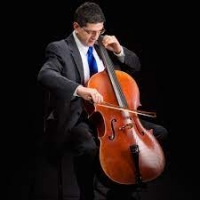
Born in Kyiv, Ukraine, cellist Yuriy Leonovich immigrated to the United States with his family. His teachers include cellists Stephen Geber and Robert DeMaine, and composer James Hartway. Leonovich earned his Doctor of Musical Arts degree from the Cleveland Institute of Music. He is a recipient of the Hope and Stanley Adelstein Prize for Excellence in Composition and Performance. Following his vision to expand the standard cello repertoire, Leonovich wrote his DMA research document on Gaspar Cassadó's cello concertos.
Music theory

Music theory is the study of the practices and possibilities of music. The Oxford Companion to Music describes three interrelated uses of the term "music theory"
Keigo Hoashi
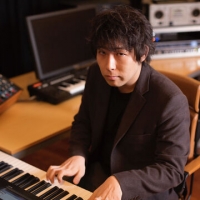
Keigo Hoashi is a composer, arranger and keyboardist. He was born in Meguro, Tokyo, Japan but moved to America after finishing high school. He graduated from the film music department at Berklee College of Music in Boston. He has been a member of the music production group MONACA since 2009.
Sarah Popejoy
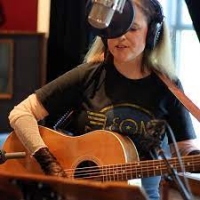
Sarah Popejoy Singer Genre: Folk Songs The Victims Have Names The Victims Have Names · 2021 Self-Righteous Stance
Raw ~ Real Action with Words · 2011 Honorable Man Raw ~ Real Action with Words · 2011
Raw ~ Real Action with Words · 2011 Honorable Man Raw ~ Real Action with Words · 2011
Traditional

Alexander Glazunov
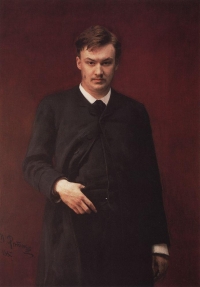
Alexander Konstantinovich Glazunov (Russian: Алекса́ндр Константи́нович Глазуно́в, 10 August 1865 – 21 March 1936) was a Russian composer, music teacher, and conductor of the late Russian Romantic period. He served as director of the Saint Petersburg Conservatory between 1905 and 1928 and was instrumental in the reorganization of the institute into the Petrograd Conservatory, then the Leningrad Conservatory, following the Bolshevik Revolution. He continued heading the Conservatory until 1930, though he had left the Soviet Union in 1928 and did not return. The best-known student under his tenure during the early Soviet years was Dmitri Shostakovich.
Leonhard de Call
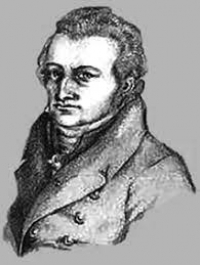
Leonhard von Call, sometimes referred to as "Leonhard de Call", was an Austrian composer and virtuoso on the mandolin and guitar. During his lifetime he focused less on performing and more upon teaching and writing music for others to play.
Bjørn-Petter Tøsse
Bjørn-Petter Tøsse (born 1994) is a Norwegian musician and composer from Hustadvika in Møre og Romsdal.
An Thuyên
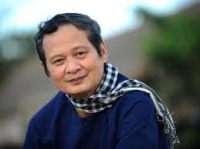
An Thuyen full name is Nguyen An Thuyen (born August 15, 1949 in Quynh Luu, Nghe An; died on July 3, 2015 at 108 Military Central Hospital, Hanoi) is a musician, instrumentalist. Major General of the Vietnam People's Army.
Mozart

Wolfgang Amadeus Mozart, full name Johann Chrysostom Wolfgang Amadeus Mozart (27 January 1756 â 5 December 1791) was a prolific and influential composer of the Classical era. His over 600 compositions include works widely acknowledged as pinnacles of symphonic, concertante, chamber, piano, operatic, and choral music. Mozart is among the most enduringly popular of classical composers, and many of his works are part of the standard concert repertoire.
Mozart's music, like Haydn's, stands as an archetypal example of the Classical style. His works spanned the period during which that style transformed from one exemplified by the style galant to one that began to incorporate some of the contrapuntal complexities of the late Baroque, complexities against which the galant style had been a reaction. Mozart's own stylistic development closely paralleled the development of the classical style as a whole. In addition, he was a versatile composer and wrote in almost every major genre, including symphony, opera, the solo concerto, chamber music including string quartet and string quintet, and the piano sonata. While none of these genres were new, the piano concerto was almost single-handedly developed and popularized by Mozart. He also wrote a great deal of religious music, including masses; and he composed many dances, divertimenti, serenades, and other forms of light entertainment.
The central traits of the classical style can be identified in Mozart's music. Clarity, balance, and transparency are hallmarks of his work.
Mozart's music, like Haydn's, stands as an archetypal example of the Classical style. His works spanned the period during which that style transformed from one exemplified by the style galant to one that began to incorporate some of the contrapuntal complexities of the late Baroque, complexities against which the galant style had been a reaction. Mozart's own stylistic development closely paralleled the development of the classical style as a whole. In addition, he was a versatile composer and wrote in almost every major genre, including symphony, opera, the solo concerto, chamber music including string quartet and string quintet, and the piano sonata. While none of these genres were new, the piano concerto was almost single-handedly developed and popularized by Mozart. He also wrote a great deal of religious music, including masses; and he composed many dances, divertimenti, serenades, and other forms of light entertainment.
The central traits of the classical style can be identified in Mozart's music. Clarity, balance, and transparency are hallmarks of his work.
Emilie Autumn

Emilie Autumn Liddell (born on September 22, 1979), better known by her stage name Emilie Autumn, is an American singer-songwriter, poet, author, violinist, and actress. Autumn's musical style is described by her as "Fairy Pop", "Fantasy Rock" or "Victoriandustrial". It is influenced by glam rock and from plays, novels, and history, particularly the Victorian era. Performing with her all-female backup dancers The Bloody Crumpets, Autumn incorporates elements of classical music, cabaret, electronica, and glam rock with theatrics, and burlesque.
Andrea Bocelii
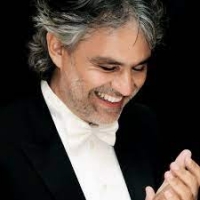
Andrea Bocelli OMRI OMDSM is an Italian opera tenor and multi-instrumentalist. He was diagnosed with congenital glaucoma at 5 months old, and became completely blind at age 12, following a football accident.
KCM (singer)

Kang Chang-mo (Hangul: 강창모; born January 26, 1982), better known by his stage name KCM (Hangul: 케이씨엠), is a South Korean singer. He debuted in 2003 with the song "I Know," from the soundtrack to the Korean drama, Punch (Hangul: 때려).
Rossini

Gioachino Antonio Rossini (February 29, 1792 – November 13, 1868) was a popular Italian composer who created 39 operas as well as sacred music and chamber music. His best known works include Il barbiere di Siviglia (The Barber of Seville), La Cenerentola and Guillaume Tell (William Tell).
Rossini's most famous opera was produced on February 20, 1816 at the Teatro Argentina in Rome. The libretto by Cesare Sterbini, a version of Pierre Beaumarchais' infamous stage play Le Barbier de Séville, was the same as that already used by Giovanni Paisiello in his own Barbiere, an opera which had enjoyed European popularity for more than a quarter of a century. Much is made of how fast Rossini's opera was written, scholarship generally agreeing upon two weeks. Later in life, Rossini claimed to have written the opera in only twelve days. It was a colossal failure when it premiered as Almaviva; Paisiello’s admirers were extremely indignant, sabotaging the production by whistling and shouting during the entire first act. However, not long after the second performance, the opera became so successful that the fame of Paisiello's opera was transferred to Rossini's, to which the title The Barber of Seville passed as an inalienable heritage.
Rossini's most famous opera was produced on February 20, 1816 at the Teatro Argentina in Rome. The libretto by Cesare Sterbini, a version of Pierre Beaumarchais' infamous stage play Le Barbier de Séville, was the same as that already used by Giovanni Paisiello in his own Barbiere, an opera which had enjoyed European popularity for more than a quarter of a century. Much is made of how fast Rossini's opera was written, scholarship generally agreeing upon two weeks. Later in life, Rossini claimed to have written the opera in only twelve days. It was a colossal failure when it premiered as Almaviva; Paisiello’s admirers were extremely indignant, sabotaging the production by whistling and shouting during the entire first act. However, not long after the second performance, the opera became so successful that the fame of Paisiello's opera was transferred to Rossini's, to which the title The Barber of Seville passed as an inalienable heritage.
Joseph Hector Fiocco
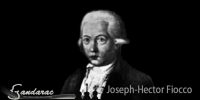
Joseph-Hector Fiocco, born in Brussels, was a composer and harpsichordist of the late Baroque period. His father, the Italian composer Pietro Antonio Fiocco, and one of his older step-brother Jean-Joseph Fiocco gave him much of his musical education.
Gunslinger Girl

Gunslinger Girl (stylized in all caps) is a Japanese manga series by Yu Aida. It began serialization on May 21, 2002 in Dengeki Daioh and ended on September 27, 2012. The chapters were also published in 15 tankōbon volumes by ASCII Media Works. Set in modern Italy, the series focuses on young cybernetic girls and their adult male handlers who use them as assassins under the directions of a government organization.
Ludwig van Beethoven

Ludwig van Beethoven (/ˈlʊdvɪɡ væn ˈbeɪt(h)oʊvən/ (About this soundlisten); German: (About this soundlisten); baptised 17 December 1770 – 26 March 1827) was a German composer and pianist. A crucial figure in the transition between the classical and romantic eras in classical music, he remains one of the most recognized and influential musicians of this period, and is considered to be one of the greatest composers of all time.
Beethoven was born in Bonn, the capital of the Electorate of Cologne, and part of the Holy Roman Empire. He displayed his musical talents at an early age and was vigorously taught by his father Johann van Beethoven, and was later taught by composer and conductor Christian Gottlob Neefe. At age 21, he moved to Vienna and studied composition with Joseph Haydn. Beethoven then gained a reputation as a virtuoso pianist, and was soon courted by Prince Lichnowsky for compositions, which resulted in Opus 1 in 1795.
Beethoven was born in Bonn, the capital of the Electorate of Cologne, and part of the Holy Roman Empire. He displayed his musical talents at an early age and was vigorously taught by his father Johann van Beethoven, and was later taught by composer and conductor Christian Gottlob Neefe. At age 21, he moved to Vienna and studied composition with Joseph Haydn. Beethoven then gained a reputation as a virtuoso pianist, and was soon courted by Prince Lichnowsky for compositions, which resulted in Opus 1 in 1795.
Saint Saens

Charles-Camille Saint-Saëns (9 October 1835 – 16 December 1921) was a French composer, organist, conductor, and pianist, known especially for The Carnival of the Animals, Danse Macabre, Samson and Delilah, Havanaise, Introduction and Rondo capriccioso, and his Symphony No. 3 (Organ Symphony).
Zoltan Paulinyi
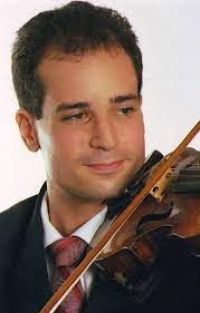
Zoltán Paulínyi Körmendy (Pittsfield, MA, 1977) conhecido pelo nome artístico de Zoltan Paulini, é um violinista, violista (barroco e moderno) e compositor americano-brasileiro. É profissionalmente ativo desde 1995, e utiliza principalmente instrumentos fabricados e restaurados pelo luthier Carlos Martins del Picchia.
Augusta Holmès
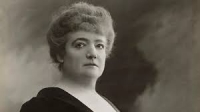
Augusta Mary Anne Holmès was a French composer of Irish descent. In 1871, Holmès became a French citizen and added the accent to her last name.
Jean Sibelius

Jean Sibelius ( pronunciation (help·info)) (8 December 1865 – 20 September 1957) was a Finnish composer of the later Romantic period whose music played an important role in the formation of the Finnish national identity. His mastery of the orchestra has been described as "prodigious."
The core of Sibelius's oeuvre is his set of seven symphonies. Like Beethoven, Sibelius used each successive work to further develop his own personal compositional style. His works continue to be performed frequently in the concert hall and are often recorded.
In addition to the symphonies, Sibelius's best-known compositions include Finlandia, the Karelia Suite, Valse triste, the Violin Concerto in D minor and The Swan of Tuonela (one of the four movements of the Lemminkäinen Suite). Other works include pieces inspired by the Finnish national epic, the Kalevala; over 100 songs for voice and piano; incidental music for 13 plays; the opera Jungfrun i tornet (The Maiden in the Tower); chamber music; piano music; Masonic ritual music; and 21 separate publications of choral music.
The core of Sibelius's oeuvre is his set of seven symphonies. Like Beethoven, Sibelius used each successive work to further develop his own personal compositional style. His works continue to be performed frequently in the concert hall and are often recorded.
In addition to the symphonies, Sibelius's best-known compositions include Finlandia, the Karelia Suite, Valse triste, the Violin Concerto in D minor and The Swan of Tuonela (one of the four movements of the Lemminkäinen Suite). Other works include pieces inspired by the Finnish national epic, the Kalevala; over 100 songs for voice and piano; incidental music for 13 plays; the opera Jungfrun i tornet (The Maiden in the Tower); chamber music; piano music; Masonic ritual music; and 21 separate publications of choral music.
Rolf Løvland
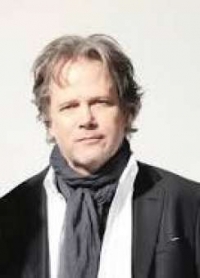
Rolf Undsæt Løvland (born 19 April 1955) is a Norwegian composer, lyricist, arranger, and pianist. Together with Fionnuala Sherry, he formed the Celtic-Nordic group Secret Garden, in which he was the composer, producer, and keyboardist. He began composing at an early age (he formed a band at the age of nine) and grew up studying at the Kristiansand Music Conservatory, later receiving his master's degree from the Norwegian Institute of Music in Oslo. Løvland has won the Eurovision Song Contest twice, composing the songs "La det swinge" in 1985 and "Nocturne" in 1995 alongside Secret Garden, resulting in Norway's first two titles.
Nicole Russo
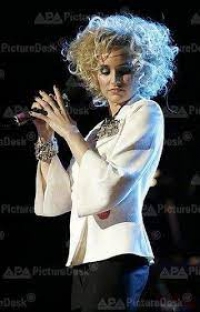
Nicole Russo Musical artist Born: 1979 (age 43 years), London, United Kingdom Movies: You Might Be Wrong, The Mercury Factor, Surrender Songs You Are the Universe Shelter · 1994 Never Stop The Brand New Heavies · 1990 Dream On Dreamer Brother Sister · 1994.
Oskar Rieding
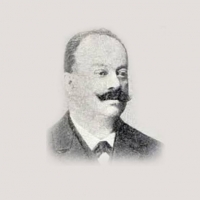
Oskar Rieding was a German violinist, teacher of music, and composer. Born: 1840, Northern Germany
Died: 1918, Celje, Slovenia Books: Air Varie Op. 23 No. 3: Violin & Piano,
Died: 1918, Celje, Slovenia Books: Air Varie Op. 23 No. 3: Violin & Piano,
George Handel
George Frideric Handel was a German, later British, Baroque composer who spent the bulk of his career in London, becoming well known for his operas, oratorios, anthems, and organ concertos
Robert Lowry
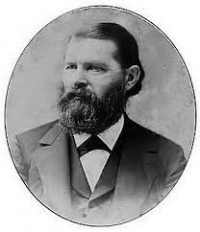
Robert Lowry (March 12, 1826 – 25 November 1899) was an American preacher who became a popular writer of gospel music in the mid- to late-19th century. His best-known hymns include "Shall We Gather at the River", "Christ Arose!", "How Can I Keep from Singing?" and "Nothing But The Blood Of Jesus".
Joe Hisaishi

Mamoru Fujisawa (藤澤 守 Fujisawa Mamoru?), known professionally as Joe Hisaishi (久石 譲 Hisaishi Jō?, born December 6, 1950), is a composer and director known for over 100 film scores and solo albums dating back to 1981.
While possessing a stylistically distinct sound, Hisaishi's music has been known to explore and incorporate different genres, including minimalist, experimental electronic, European classical, and Japanese classical. Lesser known are the other musical roles he plays; he is also a typesetter, author, arranger, and head of an orchestra.
He is best known for his work with animator Hayao Miyazaki, having composed scores for many of his films including Nausicaä of the Valley of the Wind (1984), My Neighbor Totoro (1988), Princess Mononoke (1997), Spirited Away (2001), Howl's Moving Castle (2004) and Ponyo (2008). He is also recognized for the soundtracks he has provided for filmmaker 'Beat' Takeshi Kitano, including Dolls (2002), Kikujiro (1999), Hana-bi (1997), Kids Return (1996), Sonatine (1993).
While possessing a stylistically distinct sound, Hisaishi's music has been known to explore and incorporate different genres, including minimalist, experimental electronic, European classical, and Japanese classical. Lesser known are the other musical roles he plays; he is also a typesetter, author, arranger, and head of an orchestra.
He is best known for his work with animator Hayao Miyazaki, having composed scores for many of his films including Nausicaä of the Valley of the Wind (1984), My Neighbor Totoro (1988), Princess Mononoke (1997), Spirited Away (2001), Howl's Moving Castle (2004) and Ponyo (2008). He is also recognized for the soundtracks he has provided for filmmaker 'Beat' Takeshi Kitano, including Dolls (2002), Kikujiro (1999), Hana-bi (1997), Kids Return (1996), Sonatine (1993).
Felix Mendelssohn

Jakob Ludwig Felix Mendelssohn Bartholdy, born, and generally known in English-speaking countries, as Felix Mendelssohn (February 3, 1809 – November 4, 1847) was a German composer, pianist, organist and conductor of the early Romantic period.
The grandson of the philosopher Moses Mendelssohn, he was born into a notable Jewish family, although he himself was brought up initially without religion, and later as a Lutheran. He was recognized early as a musical prodigy, but his parents were cautious and did not seek to capitalise on his abilities. Indeed his father was disinclined to allow Felix to follow a musical career until it became clear that he intended to seriously dedicate himself to it.
Early success in Germany was followed by travel throughout Europe; Mendelssohn was particularly well received in England as a composer, conductor and soloist, and his ten visits there, during which many of his major works were premiered, form an important part of his adult career. His essentially conservative musical tastes however set him apart from many of his more adventurous musical contemporaries such as Liszt, Wagner and Berlioz. The Conservatory he founded at Leipzig became a bastion of this anti-radical outlook.
Mendelssohn's work includes symphonies, concerti, oratorios, piano and chamber music. He also had an important role in the revival of interest in the music of Johann Sebastian Bach. After a long period of relative denigration due to changing musical tastes and antisemitism in the late 19th and early 20th centuries, his creative originality is now being recognized and re-evaluated. He is now among the most popular composers of the Romantic era.
The grandson of the philosopher Moses Mendelssohn, he was born into a notable Jewish family, although he himself was brought up initially without religion, and later as a Lutheran. He was recognized early as a musical prodigy, but his parents were cautious and did not seek to capitalise on his abilities. Indeed his father was disinclined to allow Felix to follow a musical career until it became clear that he intended to seriously dedicate himself to it.
Early success in Germany was followed by travel throughout Europe; Mendelssohn was particularly well received in England as a composer, conductor and soloist, and his ten visits there, during which many of his major works were premiered, form an important part of his adult career. His essentially conservative musical tastes however set him apart from many of his more adventurous musical contemporaries such as Liszt, Wagner and Berlioz. The Conservatory he founded at Leipzig became a bastion of this anti-radical outlook.
Mendelssohn's work includes symphonies, concerti, oratorios, piano and chamber music. He also had an important role in the revival of interest in the music of Johann Sebastian Bach. After a long period of relative denigration due to changing musical tastes and antisemitism in the late 19th and early 20th centuries, his creative originality is now being recognized and re-evaluated. He is now among the most popular composers of the Romantic era.
Friedrich Kuhlau
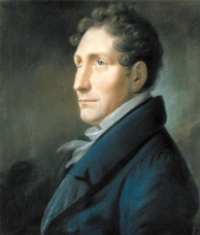
Friedrich Daniel Rudolf Kuhlau (German; Danish sometimes Frederick Kulav) (11 September 1786 – 12 March 1832) was a Danish pianist and composer during the late Classical and early Romantic periods. He was a central figure of the Danish Golden Age and is immortalized in Danish cultural history through his music for Elves' Hill, the first true work of Danish National Romanticism and a concealed tribute to the absolute monarchy. To this day it is his version of this melody which is the definitive arrangement.During his lifetime, Kuhlau was known primarily as a concert pianist and composer of Danish opera, but was responsible for introducing many of Beethoven's works, which he greatly admired, to Copenhagen audiences. Kuhlau was a prolific composer, as evidenced by the fact that although his house burned down, destroying all of his unpublished manuscripts, he still left a legacy of more than 200 published works in most genres.
F Auber
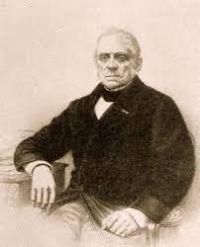
Daniel François Esprit Auber (29 January 1782, Caen - 13 May 1871, Paris) was a French composer.Despite his father's attempts to become a merchant, Auber turned to composition at an early age and went to London to teach music. Returning to Paris in 1804, Auber devoted himself entirely to art. his first opera in 1811; He wrote "Julie", attracted the attention of the Italian composer Cherubini, and became known all over the world for his works of art. She made history with the "Mute Girl with Porticili" written in 1828, and then continued to compose light operas.
Axel Bauer

Axel Bauer (born 7 April 1961) is a French singer, composer, guitarist, and actor, born in Paris. A figure of the French rock scene, he was discovered in ...
Beatles

The Beatles were an English rock band formed in Liverpool in 1960. Their best-known lineup, consisting of John Lennon, Paul McCartney, George Harrison, and Ringo Starr, became the greatest and most influential act of the rock era, introducing more innovations into popular music than any other rock band of the 20th century. Rooted in skiffle and 1950s rock and roll, the Beatles later utilized several genres, ranging from pop ballads to psychedelic rock, often incorporating classical elements in innovative ways. In the early 1960s, their enormous popularity first emerged as "Beatlemania", but as their songwriting grew in sophistication, they came to be perceived by many fans and cultural observers as an embodiment of the ideals shared by the era's sociocultural revolutions.
The band built their reputation playing clubs in Liverpool and Hamburg over a three-year period from 1960. Manager Brian Epstein moulded them into a professional act and producer George Martin enhanced their musical potential. They gained popularity in the United Kingdom after their first modest hit, "Love Me Do", in late 1962. They acquired the nickname the "Fab Four" as Beatlemania grew in Britain over the following year, and by early 1964 they had become international stars, leading the "British Invasion" of the United States pop market. From 1965 on, the Beatles produced what many critics consider their finest material, including the innovative and widely influential albums Rubber Soul (1965), Revolver (1966), Sgt Pepper's Lonely Hearts Club Band (1967), The Beatles (1968), and Abbey Road (1969). After their break-up in 1970, they each enjoyed successful musical careers. Lennon was shot and killed in December 1980, and Harrison died of lung cancer in November 2001. McCartney and Starr remain musically active.
The band built their reputation playing clubs in Liverpool and Hamburg over a three-year period from 1960. Manager Brian Epstein moulded them into a professional act and producer George Martin enhanced their musical potential. They gained popularity in the United Kingdom after their first modest hit, "Love Me Do", in late 1962. They acquired the nickname the "Fab Four" as Beatlemania grew in Britain over the following year, and by early 1964 they had become international stars, leading the "British Invasion" of the United States pop market. From 1965 on, the Beatles produced what many critics consider their finest material, including the innovative and widely influential albums Rubber Soul (1965), Revolver (1966), Sgt Pepper's Lonely Hearts Club Band (1967), The Beatles (1968), and Abbey Road (1969). After their break-up in 1970, they each enjoyed successful musical careers. Lennon was shot and killed in December 1980, and Harrison died of lung cancer in November 2001. McCartney and Starr remain musically active.
Tom Kitt
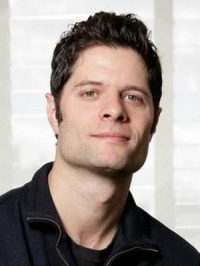
Thomas Robert "Tom" Kitt (born 1974) is an American composer, conductor, orchestrator and musician. For his score for the musical Next to Normal, he shared the 2010 Pulitzer Prize for Drama with Brian Yorkey. He also won the Tony Award and 2008 Outer Critics Circle Award, and was nominated for a Drama Desk Award for American Idiot and Everyday Rapture.
Bach

Johann Sebastian Bach (31 March 1685 – 28 July 1750) was a German composer and organist whose sacred and secular works for choir, orchestra, and solo instruments drew together the strands of the Baroque period and brought it to its ultimate maturity. Although he introduced no new forms, he enriched the prevailing German style with a robust contrapuntal technique, an unrivalled control of harmonic and motivic organisation in composition for diverse musical forces, and the adaptation of rhythms and textures from abroad, particularly Italy and France.
Revered for their intellectual depth and technical and artistic beauty, Bach's works include the Brandenburg concertos; the Goldberg Variations; the English Suites, French Suites, Partitas, and Well-Tempered Clavier; the Mass in B Minor; the St. Matthew Passion; the St. John Passion; The Musical Offering; The Art of Fugue; the Sonatas and Partitas for violin solo; the Cello Suites; more than 200 surviving cantatas; and a similar number of organ works, including the celebrated Toccata and Fugue in D Minor.
While Bach's fame as an organist was great during his lifetime, he was not particularly well-known as a composer. His adherence to Baroque forms and contrapuntal style was considered "old-fashioned" by his contemporaries, especially late in his career when the musical fashion tended towards Rococo and later Classical styles. A revival of interest and performances of his music began early in the 19th century, and he is now widely considered to be one of the greatest composers in the Western tradition.
Revered for their intellectual depth and technical and artistic beauty, Bach's works include the Brandenburg concertos; the Goldberg Variations; the English Suites, French Suites, Partitas, and Well-Tempered Clavier; the Mass in B Minor; the St. Matthew Passion; the St. John Passion; The Musical Offering; The Art of Fugue; the Sonatas and Partitas for violin solo; the Cello Suites; more than 200 surviving cantatas; and a similar number of organ works, including the celebrated Toccata and Fugue in D Minor.
While Bach's fame as an organist was great during his lifetime, he was not particularly well-known as a composer. His adherence to Baroque forms and contrapuntal style was considered "old-fashioned" by his contemporaries, especially late in his career when the musical fashion tended towards Rococo and later Classical styles. A revival of interest and performances of his music began early in the 19th century, and he is now widely considered to be one of the greatest composers in the Western tradition.
Ladislao Gabrielli
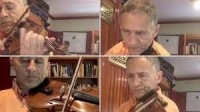
Very little information is available about Ladislao Gabrielli (1851-19??) including his dates, and where he was born and even his name.
Mathieu Crickboom
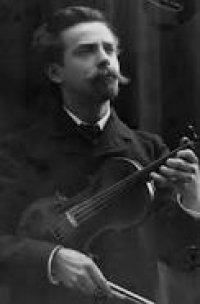
Mathieu Crickboom (2 March 1871 – 30 October 1947) was a Belgian violinist, who was born in Verviers (Hodimont) and died in Brussels.Crickboom was the principal disciple of Eugène Ysaÿe, who dedicated to him his Sonata for solo violin op. 27 No. 5. In the same vein, Ernest Chausson dedicated his string quartet to Crickboom, who for some years played second violin in the Ysaÿe Quartet.
Bruno Mars

Peter Gene Hernandez (born October 8, 1985), better known by his stage name Bruno Mars, is an American singer-songwriter and music producer. Raised in Honolulu, Hawaii by a family of musicians, Mars began making music at a young age. After performing in various musical venues in his hometown throughout his childhood, he decided to pursue a musical career. Mars began producing songs for other artists, joining production team The Smeezingtons.
He became recognized as a solo artist after lending his vocals and co-writing the hooks for the songs "Nothin' on You" by B.o.B, and "Billionaire" by Travie McCoy. He also co-wrote the hits "Right Round" by Flo Rida featuring Kesha, "Wavin' Flag" by K'naan, and "Fuck You!" by Cee Lo Green. In October 2010, he released his debut album, Doo-Wops & Hooligans. Anchored by the singles "Just the Way You Are" and "Grenade", the album peaked at number three on the Billboard 200. He has been nominated for seven Grammys at the 53rd Grammy Awards, which will be held on February 13, 2011.
He became recognized as a solo artist after lending his vocals and co-writing the hooks for the songs "Nothin' on You" by B.o.B, and "Billionaire" by Travie McCoy. He also co-wrote the hits "Right Round" by Flo Rida featuring Kesha, "Wavin' Flag" by K'naan, and "Fuck You!" by Cee Lo Green. In October 2010, he released his debut album, Doo-Wops & Hooligans. Anchored by the singles "Just the Way You Are" and "Grenade", the album peaked at number three on the Billboard 200. He has been nominated for seven Grammys at the 53rd Grammy Awards, which will be held on February 13, 2011.
Goodbye, Mr. Chips
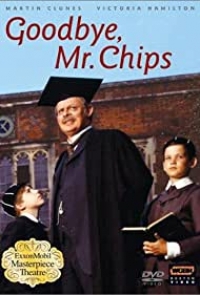
Goodbye, Mr. Chips is a 1969 American musical film directed by Herbert Ross. The screenplay by Terence Rattigan is based on James Hilton's 1934 novel Goodbye, Mr. Chips, which was first adapted for the screen in 1939.In 1920s Britain, Arthur Chipping is an established member of the teaching staff at the Brookfield public school. He is a stodgy teacher of Latin, disliked by his pupils, who find him boring and call him "Ditchy," short for "dull as ditch-water." Chips meets Katherine Bridges, a music hall soubrette, in the dining room of the Savoy Hotel in London on the eve of his summer holiday. Dissatisfied with her career and depressed by her romantic entanglements, she sets sail on a Mediterranean cruise and is reunited with Chips by chance in Pompeii. Seeing in him a lonely soul similar to herself, she arranges an evening at the theatre after they return to Britain, and the two find themselves drawn to each other. When Chips arrives at Brookfield for the autumn term, it is with his new wife on his arm, much to the shock of the staff and delight of the pupils, who find Mrs Chips' charm to be irresistible. His marriage softens him and makes him more liked by his students.
Vincent Alexandre Jockin
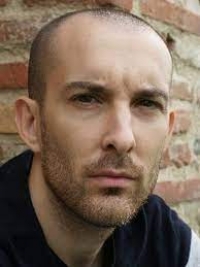
Vincent Alexandre Jockin (born 31 May 1976) is a French composer and musician.Beginning with 1995, after obtaining the bachelor's degree of Science (B.S.), Jockin continued his musical studies at the University of Toulouse, then at Conservatory when he studied Harmony and Writing (counterpoint) with Paul Badens.His first album of compositions was released in 2012: Works, Volume 1, recorded and produced at F.A.M.E.’S. Project Studio (MRT Center, Skopje, Republic of Macedonia), and performed by the Macedonian Radio Symphonic Orchestra conducted by Oleg Kondratenko. Excerpts of this album have been broadcast on France Musique and other European radio channels. His work has had premieres in Spain, Bulgaria, Croatia, Romania, Australia, USA and France.He has collaborated with Thibaut Garcia, a French guitarist, to compose several works for solo guitar.
Debussy

Achille-Claude Debussy (August 22, 1862 – March 25, 1918) was a French composer. Along with Maurice Ravel, he is considered one of the most prominent figures working within the field of Impressionist music, though he himself intensely disliked the term when applied to his compositions. Debussy was not only among the most important of all French composers but also was a central figure in all European music at the turn of the twentieth century.
Debussy's music virtually defines the transition from late-Romantic music to twentieth century modernist music. In French literary circles, the style of this period was known as Symbolism, a movement that directly inspired Debussy both as a composer and as an active cultural participant.
Debussy's music virtually defines the transition from late-Romantic music to twentieth century modernist music. In French literary circles, the style of this period was known as Symbolism, a movement that directly inspired Debussy both as a composer and as an active cultural participant.
Heitor Villa-Lobos

Heitor Villa-Lobos (March 5, 1887 – November 17, 1959) was a Brazilian composer, described as "the single most significant creative figure in 20th-century Brazilian art music". Villa-Lobos has become the best-known and most significant Latin American composer to date. He wrote numerous orchestral, chamber, instrumental and vocal works. His music was influenced by both Brazilian folk music and by stylistic elements from the European classical tradition, as exemplified by his Bachianas Brasileiras ("Brazilian Bachian-pieces").
His earliest pieces originated in guitar improvisations, for example Panqueca ("Pancake") of 1900. The concert series of 1915–21 included first performances of pieces demonstrating originality and virtuosic technique. Some of these pieces are early examples of elements of importance throughout his œuvre. His attachment to the Iberian Peninsula is demonstrated in Canção Ibéria of 1914 and in orchestral transcriptions of some of Enrique Granados' piano Goyescas (1918, now lost). Other themes that were to recur in his later work include the anguish and despair of the piece Desesperança— Sonata Phantastica e Capricciosa no. 1 (1915), a violin sonata including "histrionic and violently contrasting emotions", the birds of L'oiseau blessé d'une flèche (1913), the mother-child relationship (not usually a happy one in Villa-Lobos's music) in Les mères of 1914, and the flowers of Suíte floral for piano of 1916–18 which reappeared in Distribuição de flores for flute and guitar of 1937.
Reconciling European tradition and Brazilian influences was also an element that bore fruit more formally later. His earliest published work Pequena suíte for cello and piano of 1913 shows a love for the cello, but is not notably Brazilian, although it contains elements that were to resurface later. His three-movement String Quartet no. 1 (Suíte graciosa) of 1915 (expanded to six movements ca. 1947) is influenced by European opera, while Três danças características (africanas e indígenas) of 1914–16 for piano, later arranged for octet and subsequently orchestrated, is radically influenced by the tribal music of the Caripunas Indians of Mato Grosso.
With his tone poems Amazonas (1916, first performed in Paris in 1929) and Uirapurú (1916, first performed 1935) he created works dominated by indigenous Brazilian influences. The works use Brazilian folk tales and characters, imitations of the sounds of the jungle and its fauna, imitations of the sound of the nose-flute by the violinophone, and not least imitations of the uirapuru itself.
His earliest pieces originated in guitar improvisations, for example Panqueca ("Pancake") of 1900. The concert series of 1915–21 included first performances of pieces demonstrating originality and virtuosic technique. Some of these pieces are early examples of elements of importance throughout his œuvre. His attachment to the Iberian Peninsula is demonstrated in Canção Ibéria of 1914 and in orchestral transcriptions of some of Enrique Granados' piano Goyescas (1918, now lost). Other themes that were to recur in his later work include the anguish and despair of the piece Desesperança— Sonata Phantastica e Capricciosa no. 1 (1915), a violin sonata including "histrionic and violently contrasting emotions", the birds of L'oiseau blessé d'une flèche (1913), the mother-child relationship (not usually a happy one in Villa-Lobos's music) in Les mères of 1914, and the flowers of Suíte floral for piano of 1916–18 which reappeared in Distribuição de flores for flute and guitar of 1937.
Reconciling European tradition and Brazilian influences was also an element that bore fruit more formally later. His earliest published work Pequena suíte for cello and piano of 1913 shows a love for the cello, but is not notably Brazilian, although it contains elements that were to resurface later. His three-movement String Quartet no. 1 (Suíte graciosa) of 1915 (expanded to six movements ca. 1947) is influenced by European opera, while Três danças características (africanas e indígenas) of 1914–16 for piano, later arranged for octet and subsequently orchestrated, is radically influenced by the tribal music of the Caripunas Indians of Mato Grosso.
With his tone poems Amazonas (1916, first performed in Paris in 1929) and Uirapurú (1916, first performed 1935) he created works dominated by indigenous Brazilian influences. The works use Brazilian folk tales and characters, imitations of the sounds of the jungle and its fauna, imitations of the sound of the nose-flute by the violinophone, and not least imitations of the uirapuru itself.
David Webber

David Webber Recording artist Genre: Comedy/Spoken Word/Other Songs Comin' Back Around comin' back around · 2004
Seeing Deeply Integrating Your Vision.
Seeing Deeply Integrating Your Vision.
Nino Rota

Nino Rota (December 3, 1911, Milan – April 10, 1979, Rome) was a world-renowned Italian composer and academic who is best known for his film scores, notably for the films of Federico Fellini and Luchino Visconti. He also composed the music for two of Franco Zeffirelli's Shakespeare films, and for the first two films of Francis Ford Coppola's Godfather trilogy.
During his long career Rota was an extraordinarily prolific composer, especially of music for the cinema. He wrote more than 150 scores for Italian and international productions from the 1930s until his death in 1979—an average of three scores each year over a 46 year period, and in his most productive period from the late 1940s to the mid-1950s he wrote as many as ten scores every year, and sometimes more, with a remarkable thirteen film scores to his credit in 1954. Alongside this great body film work, he composed ten operas, five ballets and dozens of other orchestral, choral and chamber works, the best known being his string concerto. He also composed the music for many theatre productions by Visconti, Zeffirelli and Eduardo de Filippo as well as maintaining a long teaching career at the Liceo Musicale in Bari, Italy, where he was the director for almost 30 years.
During his long career Rota was an extraordinarily prolific composer, especially of music for the cinema. He wrote more than 150 scores for Italian and international productions from the 1930s until his death in 1979—an average of three scores each year over a 46 year period, and in his most productive period from the late 1940s to the mid-1950s he wrote as many as ten scores every year, and sometimes more, with a remarkable thirteen film scores to his credit in 1954. Alongside this great body film work, he composed ten operas, five ballets and dozens of other orchestral, choral and chamber works, the best known being his string concerto. He also composed the music for many theatre productions by Visconti, Zeffirelli and Eduardo de Filippo as well as maintaining a long teaching career at the Liceo Musicale in Bari, Italy, where he was the director for almost 30 years.
Joss Whedon
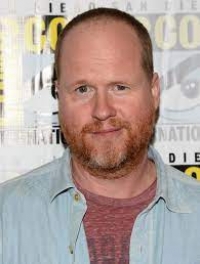
Joseph Hill Whedon (/ˈwiːdən/; born June 23, 1964) is an American film director, producer, writer, and composer. He is the founder of Mutant Enemy Productions, co-founder of Bellwether Pictures, and is best known as the creator of several television series. These include Buffy the Vampire Slayer (1997–2003), Angel (1999–2004), Firefly (2002), Dollhouse (2009–2010), and Agents of S.H.I.E.L.D. (2013–2020).
Vladimir Goncharenko
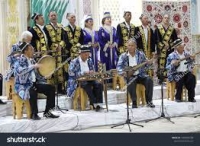
Vladimir Goncharenko russian contemporary artists,composer.
Chrono Crusade

Chrono Crusade, originally known in Japan as Chrno Crusade (Japanese: クロノクルセイド, Hepburn: Kurono Kuruseido), due to a typo, is a Japanese manga series written and illustrated by Daisuke Moriyama. It was originally published by Kadokawa Shoten in Comic Dragon, then a special issue of the Dragon Magazine. A 24-episode anime television series by Gonzo based on the manga ran from 2003 to 2004 on Fuji TV. The series was released in North America by ADV Manga and ADV Films, titled Chrono Crusade.Set in New York during the 1920s, Chrono Crusade follows the story of Rosette Christopher, and her demon partner Chrono. As members of the Magdalene Order, they travel around the country eliminating demonic threats to society, while Rosette searches for her lost brother, Joshua.
Sperion

Sperion Musician/band. Anime / Game / J-Drama / Japanese popular music and soundtrack transcriber / arranger.
The Muppet Show
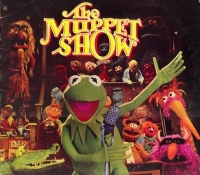
The Muppet Show is a British and American television program featuring a cast of Muppets which was produced by Jim Henson and his team from 1976 to 1981. The show stars Kermit the Frog, who was also a regular on Sesame Street. Whereas Kermit was a happy, perky and somewhat avuncular character on Sesame Street, here he is trying to keep control of the varied, outrageous, kinetic Muppet characters (and his temper), as well as keep the human guest stars happy and secure, an aspect of his personality that made it into his Sesame Street character following the start of The Muppet Show. The television show depicted a vaudeville- or music hall-style song-and-dance variety show, as well as the backstage antics involved in putting the show on.
The show was known for outrageous, physical (slapstick), sometimes absurdist comedy, and particularly for using its puppet characters to create humorous parodies. Each show also featured a human star; after the show became popular, many celebrities were eager to perform with the Muppets on television and in film. By the end of its run, over one hundred guest stars had appeared on The Muppet Show.
Muppet performers over the course of the show include Jim Henson, Frank Oz, Jerry Nelson, Richard Hunt, Dave Goelz, Steve Whitmire, Louise Gold, Kathy Mullen, Eren Ozker, and John Lovelady. Jerry Juhl and Jack Burns were two of the show writers.
The show was known for outrageous, physical (slapstick), sometimes absurdist comedy, and particularly for using its puppet characters to create humorous parodies. Each show also featured a human star; after the show became popular, many celebrities were eager to perform with the Muppets on television and in film. By the end of its run, over one hundred guest stars had appeared on The Muppet Show.
Muppet performers over the course of the show include Jim Henson, Frank Oz, Jerry Nelson, Richard Hunt, Dave Goelz, Steve Whitmire, Louise Gold, Kathy Mullen, Eren Ozker, and John Lovelady. Jerry Juhl and Jack Burns were two of the show writers.
 Sheet Music Network is a site for those who wants to access popular sheet music easily,
letting them download the sheet music for free for trial purposes.
It's completely free to download and try the listed sheet music, but you have to delete the files after 24 hours of trial.
Don't forget, if you like the piece of music you have just learned playing,
treat the artist with respect, and go buy the original sheet music.
Sheet Music Network is a site for those who wants to access popular sheet music easily,
letting them download the sheet music for free for trial purposes.
It's completely free to download and try the listed sheet music, but you have to delete the files after 24 hours of trial.
Don't forget, if you like the piece of music you have just learned playing,
treat the artist with respect, and go buy the original sheet music.
